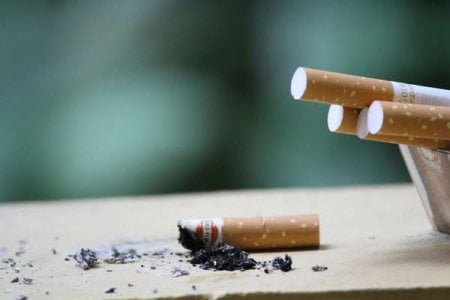New revolutionary law aims to promote a healthier generation! Here's what we know so far
By
Danielle F.
- Replies 26
South Australia is on the cusp of a public health revolution that could see the next generation grow up entirely smoke-free.
With the recent passage of groundbreaking legislation in the state's upper house, the region started taking bold strides towards a future where tobacco and electronic cigarettes are relics of the past.
The 'world-leading' new laws proposed a permanent ban on the sale of cigarettes and vapes to anyone born from 1 January 2007 onwards.
Individuals within the state will never be able to purchase tobacco or electronic cigarette products in their lifetime.
Independent MP Frank Pangallo introduced this new legislation and expressed his confidence in it.
MP Pangallo believed that this legislation would pave the way for a healthier, tobacco-free generation.
While MP Pangallo acknowledged that similar policies have been considered in the United Kingdom and New Zealand, South Australia's approach is pioneering.
'It's a progressive step and one that we need to take, and I expect the rates of smoking because of this will actually come down,' MP Pangallo stated.
The legislation also proposed to incrementally raise the legal age for purchasing cigarettes or electronic cigarettes to 19 until the 'smoke-free generation' provision is entirely in effect.
This gradual increase aimed to bridge the gap and ease the transition towards a smoke-free society.
Violators of the new legislation may face hefty fines.
First-time offenders who sell tobacco products to minors could face a hefty fine of up to $20,000.
Repeat offenders may face a $40,000 penalty.
These stringent measures underscored South Australia's commitment to tackling smoking and vaping issues among young people.
The Cancer Council's Andrew Schultz showed his support for the legislation.
Mr Schultz emphasised its importance now, as electronic cigarette usage among the youth has been on the rise.
'I think it's a really critical time at the moment because we've had the advent of vapes over the last ten years really exploding,' Schultz explained as he addressed this growing health concern.
As the bill moves to the lower house for further scrutiny, the government and opposition should have the opportunity to thoroughly examine its implications before making a final decision.
If passed, this legislation could serve as a model for other countries that want to protect their future generations from the harms of smoking and vaping.
Many of us have witnessed firsthand the devastating effects of smoking, whether through personal struggles or the loss of loved ones.
The prospect of our grandchildren growing up in a smoke-free world is a hopeful one.

Do you believe that such measures will lead to a significant decrease in smoking rates? How do you think this will impact the health of future generations? We invite you to share your thoughts on this landmark legislation in the comments section below.
With the recent passage of groundbreaking legislation in the state's upper house, the region started taking bold strides towards a future where tobacco and electronic cigarettes are relics of the past.
The 'world-leading' new laws proposed a permanent ban on the sale of cigarettes and vapes to anyone born from 1 January 2007 onwards.
Individuals within the state will never be able to purchase tobacco or electronic cigarette products in their lifetime.
Independent MP Frank Pangallo introduced this new legislation and expressed his confidence in it.
MP Pangallo believed that this legislation would pave the way for a healthier, tobacco-free generation.
While MP Pangallo acknowledged that similar policies have been considered in the United Kingdom and New Zealand, South Australia's approach is pioneering.
'It's a progressive step and one that we need to take, and I expect the rates of smoking because of this will actually come down,' MP Pangallo stated.
The legislation also proposed to incrementally raise the legal age for purchasing cigarettes or electronic cigarettes to 19 until the 'smoke-free generation' provision is entirely in effect.
This gradual increase aimed to bridge the gap and ease the transition towards a smoke-free society.
Violators of the new legislation may face hefty fines.
First-time offenders who sell tobacco products to minors could face a hefty fine of up to $20,000.
Repeat offenders may face a $40,000 penalty.
These stringent measures underscored South Australia's commitment to tackling smoking and vaping issues among young people.
The Cancer Council's Andrew Schultz showed his support for the legislation.
Mr Schultz emphasised its importance now, as electronic cigarette usage among the youth has been on the rise.
'I think it's a really critical time at the moment because we've had the advent of vapes over the last ten years really exploding,' Schultz explained as he addressed this growing health concern.
As the bill moves to the lower house for further scrutiny, the government and opposition should have the opportunity to thoroughly examine its implications before making a final decision.
If passed, this legislation could serve as a model for other countries that want to protect their future generations from the harms of smoking and vaping.
Many of us have witnessed firsthand the devastating effects of smoking, whether through personal struggles or the loss of loved ones.
The prospect of our grandchildren growing up in a smoke-free world is a hopeful one.
Key Takeaways
- South Australia recently passed legislation in the upper house to create a 'smoke-free generation' by banning tobacco and electronic cigarette sales to those born from 2007 onwards.
- Independent MP Frank Pangallo introduced the bill and aimed to create a tobacco-free generation.
- The proposed laws increase the legal age for purchasing cigarettes or vapes to 19 until the 'smoke-free generation' comes into effect, with heavy fines for non-compliance.
- The Cancer Council's Andrew Schultz highlighted the importance of the bill in addressing the recent surge in vape usage over the past decade.








